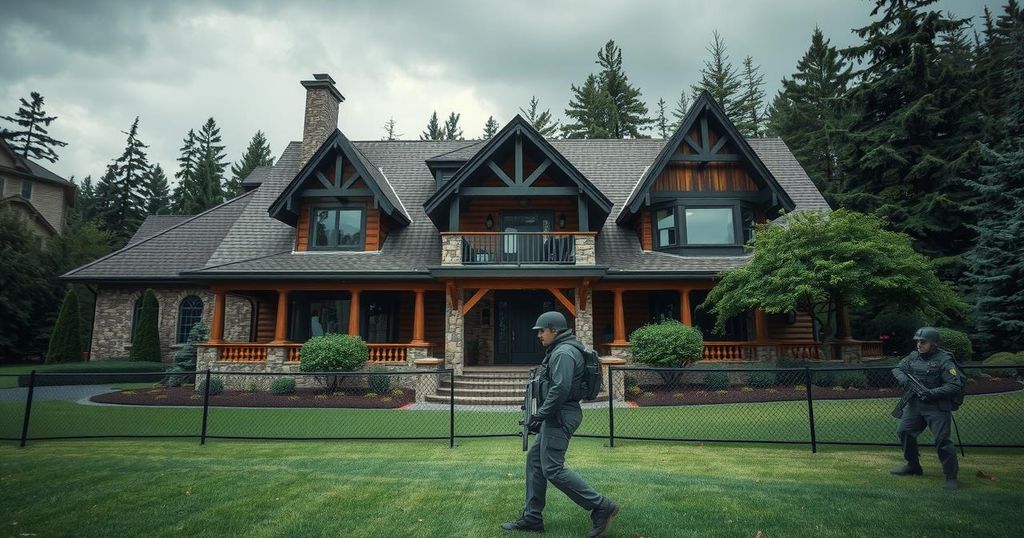Year-Long Siege: Venezuelan Opposition Members Remain Trapped in Embassy

The standoff between Maduro’s regime and five opposition members at the Argentine Embassy in Caracas has continued for a year. The group, under siege, faces hardships including limited food and psychological strains. Maduro’s government denies the siege, whereas political dynamics involving the U.S. and Brazil remain tense. The detainees continue to hope for a lawful resolution to their situation while enduring life in confinement.
For the past year, Venezuelan President Nicolás Maduro’s regime has besieged a mansion in eastern Caracas where five opposition members have taken refuge. Armed security forces consistently surround the Argentine Embassy, having threatened to breach its security on multiple occasions. Since the removal of the power supply in November, food deliveries have been infrequent, further suffocating those inside.
The five prisoners, allies of María Corina Machado, risked their safety by entering the embassy after facing arrest warrants for treason and conspiracy. Following Maduro’s contested election victory, which resulted in a crackdown on dissent and widespread protests, these individuals opted for a life of confinement rather than surrender.
Currently, they are the sole inhabitants of the embassy; the regime expelled Argentina’s diplomats last summer and local staff ceased operations out of fear. Brazil assumed the responsibility of protecting the embassy and its occupants, facilitating dialogue between them and the Venezuelan government regarding safe passage out, yet negotiations have stagnated.
Pedro Urruchurtu, an adviser to Machado, describes life in the embassy as emotionally challenging but attempts to maintain positivity. Benigno Alarcón, a political analyst, notes that the siege serves as a means of intimidation against Machado, indicating the regime’s intent to exert control over opposition figures.
The government, however, denies any siege and accuses those inside the embassy of deceit. Meanwhile, political dynamics demonstrate an impasse, particularly highlighted by shifting U.S. policies and actions towards Venezuela, causing further uncertainty in the country’s political landscape.
Urruchurtu’s daily routine involves a blend of reading, prayer, and exercise to cultivate a sense of normalcy amid the turmoil. His fellow detainee, Omar González, monitors the mansion at early hours as part of their security strategy, with the group relying on an improvised alarm system.
The residents share limited rations, surviving on canned goods accumulated during their stay, as attempts to acquire fresh food have largely failed due to barriers imposed by the government. They manage basic needs through resources available, including plastic rain barrels for water and small solar panels for power.
Historically, Venezuelan opposition members have sought refuge in embassies to escape persecution. Notably, Leopoldo López hid in the Spanish ambassador’s residence before making an escape, illustrating the ongoing dangers faced by those opposing the regime.
The Maduro government has escalated harassment against diplomatic missions, having initially permitted asylum seekers to leave, only to later retract such agreements. This behavior has been described as a form of state terrorism aimed at those who refuse to submit to the regime’s threats.
Although Brazil has provided a military plane for potential evacuation, endeavors for safe passage continue to falter. Urruchurtu stated that they are amenable to lawful solutions for leaving the country, while the regime has indicated a refusal to offer safe passage to individuals who do not support the nation.
As the group reflects on their situations by candlelight, they are at a loss regarding why the government has not stormed the embassy. González expresses a desire to conclude this chapter of their lives by achieving freedom.
In summary, the protracted standoff between the Venezuelan regime and five opposition figures within the Argentine Embassy illustrates the dire political climate in Venezuela. The government’s continued harassment of diplomatic missions, coupled with the individuals’ challenges in securing safe passage out, emphasizes the intense political repression present today. As negotiations remain stalled and external factors influence the situation, the residents strive to endure their confinement while yearning for a resolution.
Original Source: www.batimes.com.ar







